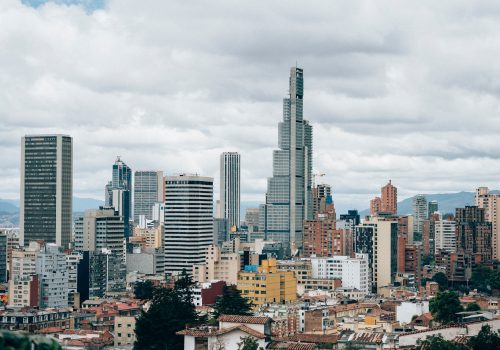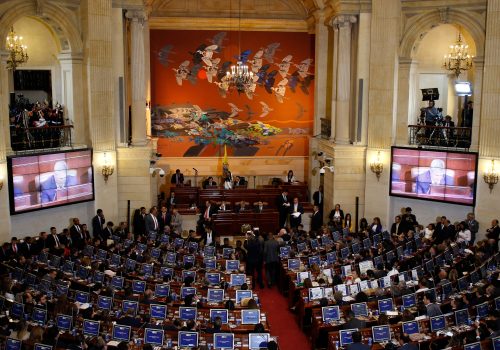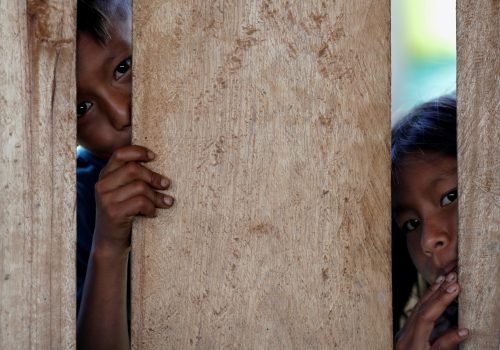Commit to democracy
AS ONE OF THE LONGEST-STANDING democracies and the first constitutional government in South America, Colombia has remained a steadfast ally of the United States, committed to democracy, the rule of law, and free enterprise. Our shared values and vision for the future have only strengthened the bonds of our two-hundred-year diplomatic relations and friendship. However, as in any relationship, challenges have arisen, such as Colombia’s armed conflict, narcotics trafficking, and the production of illicit substances like cocaine.
Serving in President George W. Bush’s administration as under secretary of state for global affairs, I worked closely with Colombian officials, including President Álvaro Uribe and Vice President Francisco Santos, on a wide range of issues dominant in the Washington-Bogotá relationship. As the State Department’s lead in assisting countries to build more democratic, secure, stable, and just societies, I found it imperative to engage Colombia. In his first presidential inaugural address, Bush said, “Our democratic faith is more than the creed of our country, it is the inborn hope of our humanity, an ideal we carry but do not own, a trust we bear and pass along.1”Government of the United States, “President George W. Bush’s Inaugural Address,” White House, January 20, 2001, https://georgewbush-whitehouse.archives.gov/news/inaugural-address.html. As we celebrate the bicentennial of our extraordinary bond, let us continue working together on four key areas: security cooperation, counter-narcotics strategies, rule of law initiatives, and environmental stewardship. Advancement and progress in these critical domains can solidify Colombia’s democratic foundation and provide a valuable model for other countries.
Security cooperation
US-Colombia security cooperation is deep and significant. Colombia was the only Latin American country to participate in the Korean War as a military ally of the United States. It was also the only South American nation to support the US-led Iraq war of 2003. Colombia also sent soldiers to Afghanistan to assist the International Security Assistance Force in its fight against the Taliban.
During President Iván Duque’s March 2022 visit to Washington DC, President Joseph R. Biden announced his intention to designate Colombia a “Major non-NATO Ally.”2Statement by Joseph R. Biden of the United States and President Iván Duque Márquez of the Republic of Columbia, US-Colombia Bicentennial Partnership, White House, March 10, 2022, https://www.whitehouse.gov/briefing-room/statements-releases/2022/03/10/joint-statement-by-president-joseph-r-biden-jr-of-the-united-states-and-president-ivan-duque-marquez-of-the-republic-of-colombia-u-s-colombia-bicentennial-partnership/. This would provide a long-term framework for our security and defense cooperation. It would also reinforce our solid bilateral defense relationship by helping support aligned defense planning, procurement, and training. Advantages of Major non-NATO Ally status include eligibility for collaboration on the development of defense technologies, access to the US defense industry, special access to military equipment financing, and joint military exchanges, exercises, and training.
The US-Colombia Strategic Alliance Act of 2022, a new legislative initiative advanced by Senate Foreign Relations Committee Chairman Robert Menendez, seeks to codify into law Colombia’s status as a “Major non-NATO Ally.3US Senate Committee on Foreign Relations press release, “Senators Menendez, Kaine Unveil U.S.-Colombia Strategic Alliance Act,” March 9, 2022, https://www.foreign.senate.gov/ press/chair/release/senators-menendez-kaine-unveil-us-colombia-strategic-alliance- act#:~:text=J.)%2C%20Chairman%20of%20the,agenda%20for%20U.S.%2DColombia%20 relations. It also lays out a forward-leaning agenda for US-Colombia relations focused on expanding engagement on economic growth, international security, refugees, human rights, the rule of law, and migration. The Chairman asserted that it will “set out a bold new chapter in US-Colombia relations.”4Bob Menendez, “My bill will make the United States’ strong bond with Colombia even stronger,” Miami Herald, February 15, 2022, https://www.miamiherald.com/opinion/op-ed/article258420598.html. Investments aimed at increased security and defense cooperation should remain strong and sustained. The US-Colombia Defense Bilateral Working Group, established in 1999, is a useful forum to discuss strategic-level defense issues and chart future cooperative actions protecting the community of democracies.
Counter-narcotics efforts
Initially conceived in 1999, with bipartisan support, Plan Colombia targeted drug cartels, sought to eradicate coca cultivation, bolster law enforcement, and end the armed conflict. The Bush administration expanded it to support “eradication, interdiction and alternative development of coca fields,” and assistance to rural areas.5June S. Beittel, Colombia: Background and U.S. Relations, Congressional Research Service, updated December 16, 2021, https://sgp.fas.org/crs/row/R43813.pdf. These strict measures were essential to counter the negative impact of drug trafficking on Colombia’s democracy and the rule of law.
Uribe was a tough counter-narcotics partner and enforced strong policies, including aerial eradication efforts on coca plantations. Bush cooperated with Uribe and advanced his tripartite strategy of “waging a global war on terror, supporting democracy, and reducing the flow of illicit drugs into the United States.”
At the State Department, I had oversight of the Bureau of International Narcotics and Law Enforcement (INL). I frequently traveled to Colombia to see firsthand its eradication attempts and law enforcement efforts, which had a real impact. In fact, a few years later, we urged Colombian officials to share their successful counter-narcotics strategies and experiences with Afghan officials.
Under the leadership of Duque, Colombia has remained a regional leader in counter-narcotic efforts but must do more to eradicate coca cultivation. The State Department’s INL Bureau’s 2022 International Narcotics Control Strategy Report describes how at least 95 percent of the cocaine samples seized in the United States in 2020 subjected to laboratory analysis were of Colombian origin.6US Department of State, International Narcotics Control Strategy Report: Volume 1, Drug and Chemical Control, Bureau of International Narcotics and Law Enforcement Affairs, March 2022, https://www.state.gov/wp-content/uploads/2022/03/22-00767-INCSR-2022-Vol-1.pdf. Coca cultivation in Colombia remains at “record” levels in 2022, as cited by the White House Office of Drug Policy Control.7Government of the United States, 2022 National Drug Control Strategy, White House Executive Office of the President’s Office of National Drug Control Policy, April 21, 2022, https://www.whitehouse. gov/wp-content/uploads/2022/04/National-Drug-Control-2022Strategy.pdf. It brings Colombian farmers less than $1 billion in revenue per year while the United States and Colombia spend billions of taxpayer money in drug control efforts.
In August 2020, the US-Colombia Growth Initiative (USGI), a bilateral strategy, was unveiled, focusing on drug eradication and sustainable investment in rural Colombia.8US Embassy Bogotá, “U.S. Government Announces Bilateral Initiative to Advance Rural Development in Colombia,” US Department of State, August 18, 2020, https://co.usembassy.gov/u-s-government-announces-bilateral-initiative-to-advance-rural-development-in-colombia/. The program is built on traditional drug interdiction, security, and assistance with a private sector-led sustainable economic growth model and alternative development programs. It addresses the urgent need to stem the cultivation and flow of illicit drugs into the United States. Creative and innovative partnerships like the USGI are needed to succeed against this longstanding challenge. We must work jointly to ensure that Colombia’s democratic institutions and the rule of law are not weakened by narcotics trafficking.
Democracy and the rule of law
Decades of corruption and lawlessness by drug cartels and illegal armed groups have severely harmed Colombia’s democracy. Until November 2021, the Revolutionary Armed Forces of Colombia was on the State Department’s list of designated Foreign Terrorist Organizations. The National Liberation Army remains on the list. These groups are responsible for decades of misery and violence that embroiled the country, took a massive human toll, and generated an economic downturn. Over the years, however, our governments have shared a strong interest in collaborating and fostering change by fighting corruption and lawlessness. We know that effective and sustainable democracy requires the rule of law.
At the State Department, I worked with Roy Godson, a Georgetown University professor emeritus. Along with a team at the National Strategy Information Center, he advanced the Culture of Lawfulness Project in Colombia, including in Medellín. This initiative used public and private funding and the participation of school systems and civil society leaders to improve public knowledge and attitudes about the rule of law. The goal of lawfulness education is to reach the next generation of students and, through them, their parents and communities. As I noted in a 2004 speech, “a culture of lawfulness changes the dynamics of law enforcement—and builds the rule of law—by marginalizing lawless behavior.” I added, “a culture of lawfulness makes two major contributions to society: it fundamentally changes the dynamics of law enforcement, and it empowers individuals.”9Paula J. Dobriansky, Under Secretary of State for Global Affairs, Remarks at Georgetown University, “Promoting a Culture of Lawfulness,” US Department of State, September 13, 2004, https://2001-2009.state.gov/g/rls/rm/2004/37196.htm. Through this creative citizen-oriented initiative, there were improvements in civic consciousness and a decline in crime and violence. Colombian law enforcement efforts against the drug cartels also contributed to reducing crime.
During this period, I also worked closely with Vice President Francisco Santos on human rights, meeting regularly to discuss cases and abuses and provide solutions. Our collaborative efforts were direct, transparent, and constructive. In turn, concrete steps were taken to investigate, prosecute, and punish those officials and others who committed human rights violations.
To protect human rights and human dignity, Colombia must further strengthen those mechanisms to safeguard the rule of law and human rights and enforce security. Forward-looking initiatives, like the Culture of Lawfulness Project, focused on educating the next generation on the importance of the rule of law, are paramount in fostering a more peaceful, vibrant Colombia.
Environmental stewardship
One of the most innovative initiatives enacted by Congress in 1998 was the Tropical Forest Conservation Act, which has enabled eligible developing countries to reduce their debts to the United States and undertake action to protect their tropical forests.
In 2004, the United States, Colombia, and three environmental non-governmental organizations (NGOs)—Conservation International, The Nature Conservancy, and the World Wildlife Fund—signed agreements to reduce Colombia’s debt to the United States by more than $10 million. In return, Colombia promised to use those funds toward conservation efforts in several important tropical forest areas, including Tropical Andes, the Llanos region in the Orinoco Basin, and the Caribbean. The program became known as the Debt-for-Nature agreement. Colombia became the fifth country in Latin America to benefit from this program; the others were Belize, El Salvador, Panama, and Peru.10US Department of State press release, “Debt-for-Nature Agreement for the Republic of Colombia,” April 23, 2004, https://2001-2009.state.gov/r/pa/prs/ps/2004/31741.htm. It created a permanent endowment for preserving Colombia’s tropical forests while advancing its economy. Since signing these agreements, communities have safeguarded more than 700,000 hectares of forest, reduced deforestation by more than 15,000 hectares of mega-diverse forest, and protected more than 70 species, according to the US embassy in Bogotá.11US Embassy Bogotá, A one-hundred-year commitment to conservation and childhood in Colombia,” US Department of State, May 25, 2021, https://co.usembassy.gov/a-one-hundred-year-commitment-to-conservation-and-childhood-in-colombia/#:~:text=In%20%202004%2C%20the%20U.S.%20and,direct%20participation%20of%20local%20communities.
This creative program should continue and expand with sustained US funding. It has had multiple positive impacts in Colombia, including protecting and conserving tropical forest areas and enhancing local civic involvement and community action to support the environment and economic growth. New NGOs have been created and will further strengthen Colombia’s civil society.
Moving forward
We have learned a great deal from our challenges and experiences. As we look forward to our next bicentennial, we must continue to bolster US-Colombia ties. Through our security cooperation, counter-narcotics efforts, promotion of civil society, and environmental initiatives, we are collaborating to support a strong foundation for democracy and the rule of law to flourish in Colombia. As Simón Bolivar once said, “A people that loves freedom will in the end be free.”12Simón Bolívar, “Letter from Jamaica,”1815, https://www.britannica.com/topic/Letter-from-Jamaica. This is the very spirit that pervades Colombia.
* * *
Amb. Paula J. Dobriansky is a senior fellow at the Future of Diplomacy Project at the Harvard University Belfer Center and vice chair of the Atlantic Council’s Scowcroft Center for Strategy and Security. During her thirty years in national security affairs, she served as under secretary of state for global affairs (2001-2009), director of European and Soviet Affairs at the National Security Council and deputy assistant secretary of state for human rights and humanitarian affairs. From 1997-2001, she was senior vice president and director of the Council on Foreign Relations.
Related Allies essays
A roadmap for a new type of engagement
This moment opens the door for a reimagined US partnership with Colombia based on a shared vision for a more prosperous, inclusive, and sustainable future.
Related program

The Adrienne Arsht Latin America Center broadens understanding of regional transformations and delivers constructive, results-oriented solutions to inform how the public and private sectors can advance hemispheric prosperity.
Image: A person prepares their ballot at a booth during congressional and presidential coalitions elections that will determine which candidates will head to the first round of presidential voting, in Bogota, Colombia March 13, 2022. REUTERS/Luisa Gonzalez



